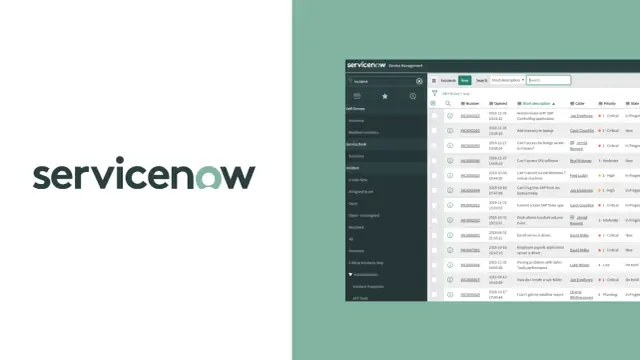ServiceNow
Discover ServiceNow – a platform for process optimization and workflow automation.

In the world of enterprise workflow optimization, ServiceNow stands as a powerhouse, transforming how organizations manage their processes, tasks, and digital interactions. Founded in 2004 by Fred Luddy, ServiceNow has become a leader in providing cloud-based, no-code, and low-code platforms that enable businesses to enhance productivity, streamline operations, and drive innovation.
How Does It Work?
ServiceNow offers a comprehensive suite of tools designed to simplify complex processes and foster collaboration across various organizational departments. At its core, ServiceNow provides a platform-as-a-service (PaaS) solution that empowers technical and non-technical users to create, customize, and deploy applications without requiring extensive coding.
The platform leverages a no-code approach, allowing users to design workflows, automate tasks, and build applications through intuitive visual interfaces. With drag-and-drop functionality, users can model processes, design user interfaces, and configure business rules to match their unique requirements. For more advanced users, ServiceNow also supports low-code capabilities, enabling the creation of more complex applications and integrations through the use of code snippets and scripting.
ServiceNow's strength lies in its ability to centralize information, automate repetitive tasks, and orchestrate processes across different departments, such as IT, HR, customer service, and more. By offering a unified platform, ServiceNow enables organizations to break down silos, enhance communication, and achieve operational excellence.
The platform's architecture is built on a multi-instance, cloud-based model, ensuring scalability, security, and reliability. Users can leverage various pre-built templates, modules, and applications to accelerate their development process and address common enterprise challenges.
With ServiceNow, businesses can transform their operational efficiency, drive digital transformation, and elevate customer and employee experiences by harnessing the power of no-code and low-code solutions.

Key Features of ServiceNow
ServiceNow's extensive suite of features empowers organizations to transform their workflows and operations, driving efficiency, collaboration, and innovation. One of its standout features is its no-code and low-code capabilities, enabling users to design and deploy applications without requiring advanced coding skills. This empowers technical and non-technical users to create customized solutions tailored to their needs.
The platform offers a unified interface for managing various processes, such as IT service management, human resources, customer service, and more. Users can design workflows, automate tasks, and integrate with external systems seamlessly. ServiceNow's extensive library of pre-built applications and templates accelerates development, allowing users to address common challenges quickly.
ServiceNow's ability to orchestrate and automate complex processes sets it apart, enhancing collaboration across departments and reducing manual intervention. Its reporting and analytics tools provide insights into performance, allowing businesses to make data-driven decisions.
Security and compliance are paramount in today's digital industry, and ServiceNow delivers with advanced security features and regulatory compliance tools. The platform's scalability and cloud-based architecture ensure businesses can adapt to changing needs while maintaining reliability and performance.
Incorporating AI and machine learning capabilities, ServiceNow empowers organizations to leverage predictive insights, automation, and intelligent recommendations. This fosters a proactive approach to addressing issues and delivering exceptional customer experiences.
Try AppMaster no-code today!
Platform can build any web, mobile or backend application 10x faster and 3x cheaper
Who Can Use It?
ServiceNow's versatility extends across industries and business functions, making it a valuable tool for many enterprises.
- IT Departments: ServiceNow equips IT departments with powerful tools to streamline service management, automate incident resolution, manage assets, and orchestrate complex IT processes. IT teams can enhance efficiency, improve response times, and ensure seamless IT operations.
- Human Resources: Human resources teams can leverage ServiceNow to transform employee experiences. From automating onboarding processes to managing performance evaluations and leave requests, the platform empowers HR professionals to streamline administrative tasks and focus on strategic initiatives.
- Customer Service: ServiceNow enhances customer service operations by facilitating efficient issue resolution, tracking customer interactions, and delivering personalized support. The platform's capabilities ensure that customer service teams can deliver exceptional experiences and maintain high levels of customer satisfaction.
- Operations and Facilities: Organizations can use ServiceNow to manage facilities, maintenance requests, and operational tasks. This streamlines processes, reduces downtime, and ensures a well-maintained environment for employees and customers.
- Financial Services: In the financial sector, ServiceNow helps streamline compliance processes, manage risk, and automate financial operations. It ensures regulatory compliance, enhances security, and improves operational efficiency.
- Healthcare: Healthcare institutions can utilize ServiceNow to enhance patient care, manage medical equipment, and automate administrative tasks. The platform's capabilities contribute to improved patient outcomes and operational efficiency.
ServiceNow vs. AppMaster
In the realm of digital transformation and process optimization, both ServiceNow and AppMaster hold their unique positions, catering to different aspects of an organization's needs.
AppMaster stands out for its specialization in application development using a no-code approach. It empowers users, regardless of their coding background, to easily create backend, web, and mobile applications. The platform's innovative features allow users to visually design data models, business logic, and user interfaces, eliminating the need for complex coding.
AppMaster's unique ability to generate source code for applications, compile, test, and deploy them to the cloud accelerates the development process significantly. This approach is particularly valuable for businesses looking to rapidly create and iterate on applications without the traditional coding barriers.
Choosing the Right Fit
When considering ServiceNow vs. AppMaster, organizations should evaluate their specific needs and priorities. ServiceNow excels in providing a holistic platform for process optimization and collaboration. On the other hand, AppMaster is a go-to solution for those focused on agile application development, enabling them to create functional applications quickly across different platforms without extensive coding knowledge.
In the ever-evolving world of digital solutions, both ServiceNow and AppMaster offer valuable tools to drive innovation, improve operational efficiency, and meet the unique demands of modern businesses. The decision depends on the specific goals and challenges an organization aims to address.



